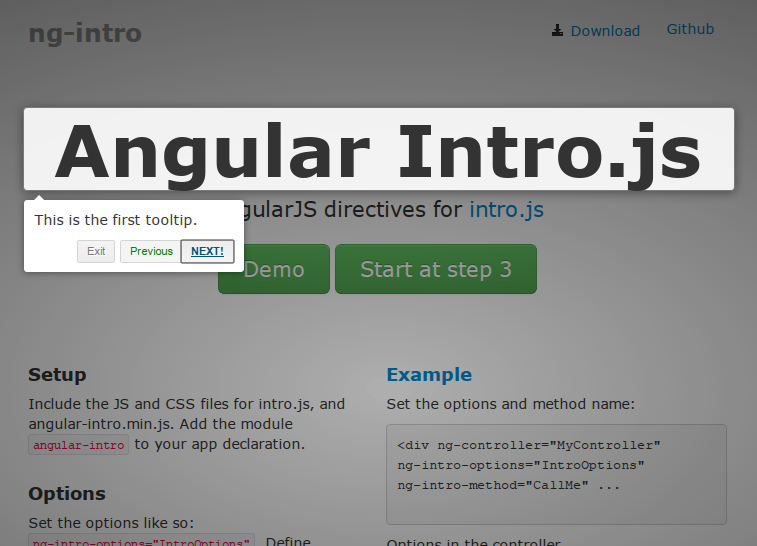Package Exports
- angular-intro-ci-dev
This package does not declare an exports field, so the exports above have been automatically detected and optimized by JSPM instead. If any package subpath is missing, it is recommended to post an issue to the original package (angular-intro-ci-dev) to support the "exports" field. If that is not possible, create a JSPM override to customize the exports field for this package.
Readme
angular-intro.js 
An angularjs directive that wraps intro.js functionality.

See the project page for an overview.
Bower
You can install this package through Bower by using the following command :
bower install angular-intro.js --saveHow to use
The two main directives are ng-intro-options and ng-intro-method.
Setting Options
ng-intro-options="IntroOptions"
You should create a $scope.IntroOptions in your controller which contains the intro.js options. The options are exactly the same as the original. This also allows you to modify the options as part of your controller behavior if necessary. You don't have to use IntroOptions, you can specify some other name.
Start method
ng-intro-method="CallMe"
The directive will create a method on $scope.CallMe so that you can invoke it yourself later. Make sure the there isn't a method CallMe already in your controller. To use the method be sure to wrap it with $timeout. You don't have to use CallMe, you can specify some other name.
Call the start method
You can invoke it from an event such a click,
ng-click="CallMe();"
as long as you are still in the same controller scope. You can also specify a step number in the method call, CallMe(3);.
You can start the intro from code, either call $scope.CallMe();. If the $scope.CallMe(); doesn't work, it might be because your DOM isn't ready. Put it in a $timeout.
Autostart
If you set ng-intro-autostart="true", the intro will start as soon as the directive is ready.
Autorefresh
If an intro tour includes dynamic content, use ng-intro-autorefresh="true" to call Intro.js' refresh method.
Callbacks
Intro.js provides several callbacks. You can receive these callbacks in your controller. For example, for the onchange event, specify the function name in the directive.
ng-intro-onchange="ChangeEvent"
In your controller, create ChangeEvent
$scope.ChangeEvent = function (targetElement, scope) {
console.log("Change Event called");
console.log(targetElement); //The target element
console.log(this); //The IntroJS object
};The other intro.js callbacks you can specify are ng-intro-oncomplete, ng-intro-onexit, ng-intro-onchange ng-intro-onbeforechange and ng-intro-onafterchange.
Exit Method
ng-intro-exit-method="ExitMe"
Then in your controller, you can force exit using
$scope.ExitMe(function() { //callback } );
Plunker
You can also use this sample plunker
How to build
If you want to build or contribute, first, get the node modules needed (grunt, bower)
npm installNext, use bower to get the JS libraries needed
node_modules/.bin/bower installThen, whenever you make any changes, get grunt to build the minified angular-intro.min.js
node_modules/.bin/grunt Finally, view the demo page to make sure everything's working; start a web server:
./node_modules/.bin/grunt connect:serverAnd browse to http://localhost:8000/example/index.html
License
As with intro.js, this is under the MIT license.